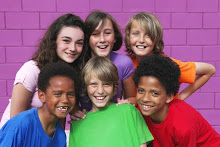Book of the Day: The Whole-Brain Child

Thus far, I am LOVING it. Basically, the gist is, that our left brain is the logical side (as we all know). It's the part that says, "but mom you said I could. . ." The right brain is the less logical, artsy, emotional side. "Jane was mean to me, I am never going back to school, ever ever ever." As we all know, the pre-teen years can seem like a never-ending flood of the right brain emotions.
The authors give the metaphor of a river (and I love river metaphors!). On one bank is the logical side, on the other is the emotional side. We want to integrate the two of them and help our children and clients to integrate the two sides. If we crash up against one side or the other we are either too rigid or too emotional and neither of these extremes are the best for the brain.
In my job as a School Counselor I noticed that there were three styles that teachers had in working with relational aggression in the classroom. Some teachers wanted to help girls handle every friendship issue, small and large. After recess they'd be out in the hallway helping the girls to sort through it all and letting the emotions tumble out. Often this would make things worse and the teacher would then have no idea how to move on from this emotional state to actual teaching. The second style is the teacher that doesn't deal with friendship issues at all. There is no time or energy given to whatever goes on in the playground. The girls are left with bottled up feelings and no way to release them. The third style is a teacher that does a little bit of both. They help girls manage their feelings (or send them to the appropriate adult like the School Counselor), but they also create a safe classroom structure where the flood of feelings can not go on indefinitely. I don't know exactly how these teachers do it, maybe it's just an intuitive art, but to me the middle of the road is the best--and now I know why. Without knowing it, these teachers are gently guiding their students back to the middle of the river.
This book mirrors the idea of John Gottman's Emotion Coaching http://www.gottman.com/ where you first connect with a child's feelings and then move into problem solving. In other words, you meet them right brain to right brain first.
Thus far, I highly recommend this book. I can't wait to get to the 12 strategies!
http://www.wholebrainchild.com/
Dan Siegel's Ted Talk Video:
http://www.youtube.com/watch?v=Nu7wEr8AnHw
Dan Siegel's Mindsight Institute (for adults I think):
https://www.mindsightinstitute.com/
http://drdansiegel.com/
Tina Bryson's great blog: (answers lots of questions)
http://tinabryson.com/articles-blog/
Labels: brain research, parenting, teacher helping solve relational aggression, whole brain


0 Comments:
Post a Comment
Subscribe to Post Comments [Atom]
<< Home